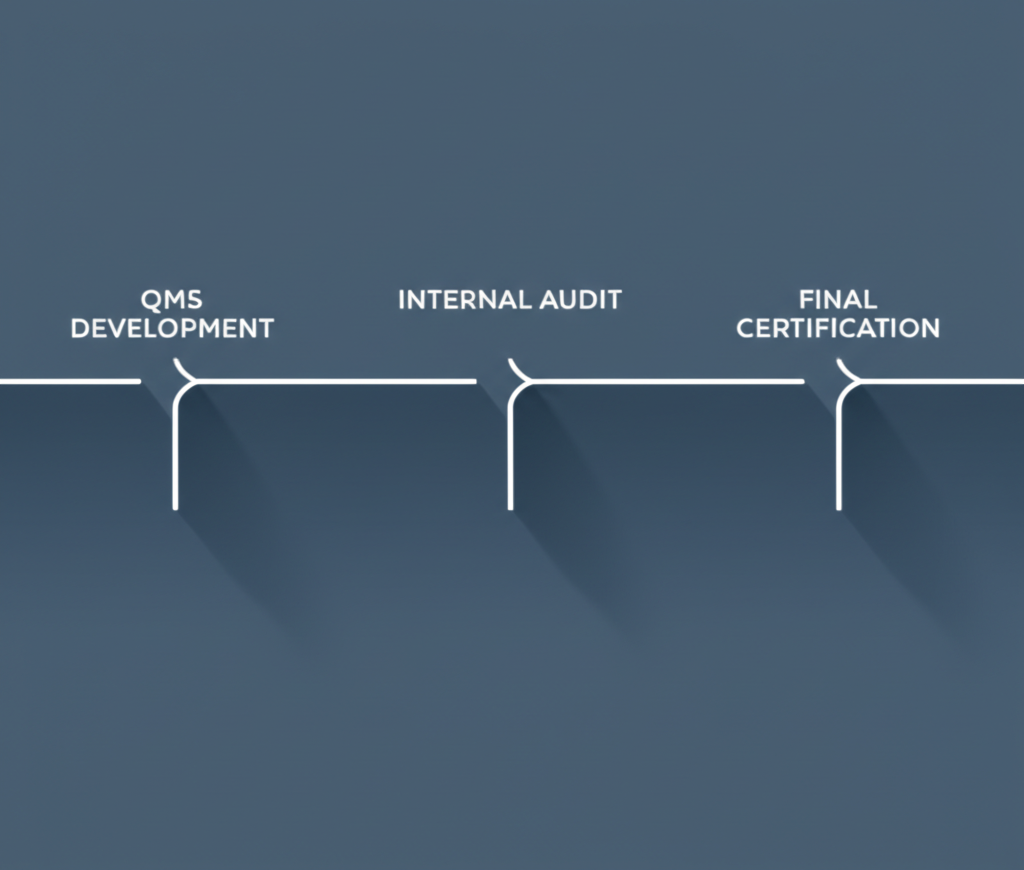What an ISO 9001 Certified Machine Shop Truly Delivers

TL;DR
An ISO 9001 certified machine shop operates under a strict Quality Management System (QMS) that guarantees process consistency, full traceability of materials and parts, and reliable results. This certification is often a non-negotiable requirement for securing high-value contracts in industries like aerospace, medical, and defense, as it serves as internationally recognized proof of a commitment to quality and risk management.
Understanding ISO 9001 in the Machining Context
At its core, ISO 9001:2015 is an international standard that outlines the requirements for a Quality Management System (QMS). For a machine shop, this isn't just a certificate on the wall; it's a fundamental operational philosophy. A QMS is a formalized system of documented processes, procedures, and responsibilities for achieving quality policies and objectives. As detailed by experts at Arbiser Machine, this means having pre-established, document-controlled processes that every employee must follow, leaving no room for subjective interpretation and ensuring every action is deliberate and repeatable.
A critical principle within ISO 9001 for machining is traceability. This is the ability to track every component, material, and process from start to finish. A certified shop can trace a finished part back through every step of its creation—from the specific batch of raw material it came from to the machine it was milled on and the technician who inspected it. This meticulous record-keeping is invaluable for quality control, especially when troubleshooting an issue. If a defect is found, the shop can pinpoint the exact origin of the problem and implement corrective actions to prevent it from happening again.
Ultimately, the goal of implementing a QMS is to achieve unwavering consistency. In precision machining, where tolerances can be measured in microns, even minor deviations can lead to part failure. By adhering to standardized, process-driven workflows, an ISO 9001 certified machine shop can guarantee that the thousandth part produced is identical in quality to the first. This focus on meeting customer expectations and delivering satisfaction is what elevates the standard from a general management system to a true Quality Management System, as noted by Royster's Machine Shop.

The Key Benefits of ISO 9001 Certification for Your Shop
Pursuing and achieving ISO 9001 certification requires a significant investment of time and resources, but the strategic advantages it provides are substantial. For many machine shops, this standard is the key to unlocking new levels of growth, efficiency, and market access. The benefits extend far beyond simply meeting a customer requirement; they transform the entire operation for the better.
- Access More Lucrative Contracts: Many high-stakes industries, including aerospace, defense, medical, and automotive, will only work with suppliers who are ISO 9001 certified. As Owens Industries points out, certifications like ISO 9001 and AS9100 are foundational for serving sectors where precision and reliability are non-negotiable. This certification opens doors to projects that are otherwise inaccessible, significantly expanding a shop's potential customer base.
- Enhance Operational Efficiency: Documented processes and clear directives eliminate ambiguity and reduce waste. When everyone knows exactly what to do and how to do it, mistakes, rework, and scrap rates plummet. This process-driven approach, often described as an "audit lifestyle," ensures that needs are anticipated, workflows are streamlined, and preventative maintenance is integrated, leading to faster, more efficient production.
- Improve Customer Confidence and Trust: ISO 9001 is a globally recognized benchmark for quality. When a customer sees that a shop is certified, they have immediate assurance that the business is committed to a high standard of quality and has been verified by an independent third party. This builds immense trust and can be a powerful differentiator in a competitive market.
- Foster a Culture of Continuous Improvement: The ISO 9001 standard is not a one-time achievement; it requires ongoing audits and a commitment to continuous improvement. The framework mandates that a shop regularly reviews its processes, gathers data, and seeks out opportunities to refine its operations. This leads to a proactive culture focused on preventing problems and consistently enhancing quality and customer satisfaction.
When sourcing parts for critical applications, partnering with a certified shop is paramount. For example, providers like XTJ CNC Machining Services leverage their ISO 9001 certification to deliver high-precision components for demanding industries, offering rapid turnaround on both prototypes and volume production.
The Path to Certification: Steps, Requirements, and Costs
Achieving ISO 9001 certification is a structured journey that involves several distinct phases. According to an overview on Manufacturing.net, the process begins with understanding the standard's requirements and applying them to your specific operations. While the path can be tailored, it generally follows a clear, step-by-step progression.
- Develop and Document Your QMS: This is the foundational step where you create the procedures and policies that will govern your shop's operations. This includes everything from how you handle purchase orders and inspect raw materials to your processes for machine calibration and final part inspection. Every critical process must be documented.
- Implement the QMS and Train Employees: Once the system is documented, it must be put into practice. This involves training all relevant employees on the new procedures to ensure everyone understands their roles and responsibilities within the quality system. Consistent implementation is key to success.
- Conduct an Internal Audit: Before bringing in an external auditor, you must conduct your own internal audit. This is a self-check to ensure your QMS is working as intended and conforms to ISO 9001 standards. It helps identify any gaps or non-conformances that need to be addressed.
- Undergo the Certification Audit: This final step involves hiring an accredited certification body to perform a formal audit. The auditor will review your documentation, interview employees, and observe your processes to verify that your QMS meets all ISO 9001 requirements. If you pass, you are awarded the certification.
The cost of certification can vary significantly based on the size of the machine shop and the complexity of its operations. Some shops may choose to hire a consultant to guide them through the process, while others may manage it in-house. Based on general industry data, the investment can be broken down into several components:
| Activity | Estimated Cost | Typical Duration |
|---|---|---|
| Prepare Quality System Procedures | $1,500 | 1 month |
| QMS Implementation | $2,000 | 3-6 months |
| Internal Audit | $750 | 1 week |
| Certification Body Audit | $3,500 | 2-5 days |
Note: These figures are estimates and can vary. They are intended to provide a general idea of the potential financial investment required.

How to Verify a Machine Shop's ISO 9001 Certification
In a marketplace where quality claims are common, verifying a machine shop's ISO 9001 certification is a crucial step in due diligence. This ensures you are partnering with a company that truly adheres to international quality standards, not just one that claims to. Fortunately, there are straightforward ways to confirm a company's certification status.
The first and most direct method is to ask the machine shop for a copy of their ISO 9001 certificate. A legitimate, certified company will readily provide this document. When you receive it, check for key details: the company's name and address, the scope of the certification (i.e., what processes are covered), the certification body (registrar) that issued it, and the certificate's expiration date. ISO 9001 certifications are not permanent and require periodic surveillance audits to remain valid.
For an additional layer of verification, you can check with the certification body that issued the certificate. Most registrars maintain a database of the companies they have certified. Furthermore, some accreditation bodies offer central verification tools. For example, the United Kingdom Accreditation Service (UKAS) provides a free online tool called CertCheck, which allows users to search and verify the validity of claims of UKAS-accredited certification for standards like ISO 9001.
Frequently Asked Questions
1. How much does an ISO 9001 cert cost?
The total cost for ISO 9001 certification can range from several thousand to over ten thousand dollars, depending on the size and complexity of the machine shop. Key expenses include developing and implementing the Quality Management System (QMS), conducting an internal audit, and paying the fees for the external certification body's audit. Using a consultant will add to the cost but can streamline the process.
2. How can I check if a company is ISO 9001 certified?
To verify a company's ISO 9001 certification, start by requesting a copy of their certificate and check its validity dates and scope. You can then confirm its authenticity with the issuing certification body. For further assurance, you can use public tools like UKAS CertCheck to search for and validate accredited certifications online.





